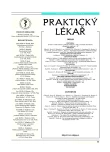Brachyspirae – agents of intestinal spirochetosis
Brachyspiry – původci intestinální spirochetózy
Spirálovité bakterie rodu Brachyspira bývají izolovány v souvislosti se stavem zvaným intestinální spirochetóza. Při něm se tyto anaerobní spirochéty zavěsí jedním koncem na kolorektální epitel a formují falešný kartáčový lem. Stav může být spojen s chronickým průjmem, rektálním krvácením, bolestmi břicha a hubnutím, takže vyvolá podezření na kolorektální karcinom. Lékem volby je metronidazol. Kolonizace brachyspirami je relativně běžná v rozvojových zemích, u nás přichází v úvahu spíše u HIV pozitivních osob a u homosexuálů. Diagnostiku brachyspir komplikuje (jako u všech spirochét) obtížná kultivace agens, takže se většinou diagnostikují postupy molekulárně-biologickými.
Klíčová slova:
intestinální spirochetóza – Brachyspira aalborgi – Brachyspira pilosicoli.
Authors:
V. Woznicová; Heroldovám.
Authors‘ workplace:
Mikrobiologický ústav LF MU a FN u sv. Anny, Brno
přednosta prof. MUDr. M. Votava
Published in:
Prakt. Lék. 2005; 85(2): 95-96
Category:
Diagnostis
Overview
Spiral bacteria of the genus Brachyspira are usually isolated in connection with cases of intestinal spirochetosis, wherein these anaerobic spirochetes cling by one end to the colorectal epithelium forming thus a false brush border. That can be associated with chronic diarrhea, rectal bleeding, abdominal pain, and body wasting, giving a picture of suspect colorectal carcinoma. Metronidazol is the therapeutic of choice. Colonization with brachyspirae is relatively frequent in the developing countries; in our country it comes in consideration in HIV-positive subjects and in homosexuals. The diagnostics of brachyspirae is complicated (as in all spirochetes) by difficulties in cultivation of the agent, so that molecular biology methods are the usual diagnostic tool.
Key words:
intestinal spirochetosis – Brachyspira aalborgi – Brachyspira pilosicoli.
Labels
General practitioner for children and adolescents General practitioner for adultsArticle was published in
General Practitioner

2005 Issue 2
- Advances in the Treatment of Myasthenia Gravis on the Horizon
- Hope Awakens with Early Diagnosis of Parkinson's Disease Based on Skin Odor
- Memantine in Dementia Therapy – Current Findings and Possible Future Applications
- Memantine Eases Daily Life for Patients and Caregivers
- Possibilities of Using Metamizole in the Treatment of Acute Primary Headaches
-
All articles in this issue
- Guidelines for diagnostic and therapeutic procedures in arterial hypertension – the 2004 version Czech Society of Hypertension guidelines
- WHO on the problems of sun bathing in solarium facilities
- Physical activity and cancer prevention
- Treatment of traumatic lesions of the brachial plexus
- Patients treated for addiction disorders at the Bohnice Psychiatric Clinic in the years 1994–2003
- Inborn anomalies of the coronary arteries: three case reports
- Diagnosis and treatment patient with acute endocarditis
- Brachyspirae – agents of intestinal spirochetosis
- The diabetic foot and hyperbaric oxygen therapy
- The anxious patient with cardiovascular symptomatology
- Can we recognize the patient’s willingness to abide by the physician’s advice?
- General Practitioner
- Journal archive
- Current issue
- About the journal
Most read in this issue
- Brachyspirae – agents of intestinal spirochetosis
- The diabetic foot and hyperbaric oxygen therapy
- Treatment of traumatic lesions of the brachial plexus
- Inborn anomalies of the coronary arteries: three case reports
